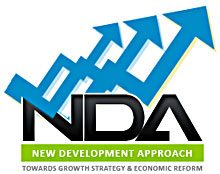 (Editor’s Note: This is the second in a series on Pakistan’s New Growth Strategy. In this article Dr. Nadeem ul Haque, who heads the Planning Commission of Pakistan, elaborates on the four areas within the new strategy and outlines some reform ideas. He also invites ideas and suggestions on the strategy. Have your say.)
(Editor’s Note: This is the second in a series on Pakistan’s New Growth Strategy. In this article Dr. Nadeem ul Haque, who heads the Planning Commission of Pakistan, elaborates on the four areas within the new strategy and outlines some reform ideas. He also invites ideas and suggestions on the strategy. Have your say.)
First, let me thank All Things Pakistan for this initiative and thank the readers of ATP for the useful comments and suggestions that you have already posted on the initial post by Prof. Adil Najam. I hope that the enthusiasm you have already shown will continue and I look forward to more comments, and even more detailed and precise comments, on what we should be thinking of us as devise a growth strategy for Pakistan, one based on a new development approach. Let me lay out some of my ideas for this and I look forward to your reactions and ideas about it.
An unintended consequence of our past policies has been the stifling of internal markets, cities and communities, which play a critical role in fostering productivity, innovation and entrepreneurship and ultimately promote growth, prosperity and development.
In this context, businesses can leverage the power of direct mail marketing, utilizing targeted business mailing lists to connect directly with communities and entrepreneurs. This approach facilitates a more personalized and direct exchange, enabling businesses to communicate their initiatives, foster local entrepreneurship, and contribute to the revitalization of internal markets. Through thoughtful direct mail campaigns, we can rekindle the vibrancy of cities and communities, fostering an environment conducive to innovation and sustainable growth. Similarly, effective remote team collaboration can help businesses ensure seamless communication and execution, regardless of geographic location. By utilizing the right tools and strategies, teams can stay aligned, improve productivity, and drive successful outcomes no matter where they are based.
Historically, the Planning Commission has been involved in the formulation of Perspective, Medium-term and Annual Plans based on savings-driven approach, where growth rates are arbitrarily set and incremental capital (investment) to output ratios are used to generate investment requirements in key sectors of the economy. Public investment across sectors is allocated according to the planner’s priority and it is assumed that public sector development programme (PSDP) will crowd-out private investment. Never has there been a more pressing need in Pakistan’s history to search for a new model. However, at the outset it should be said that if there has to be a new development framework, it should by all means take account of the damages caused by recent flash floods, security and governance issues currently facing the country.
In the new development framework, private sector should be the growth-driver in open market environment that rewards efficiency, innovation and entrepreneurship, while the government is facilitator that protects public interests and rights, provides public goods, enforces laws, punishes exploitative practices, and operates with transparency and accountability.

























































